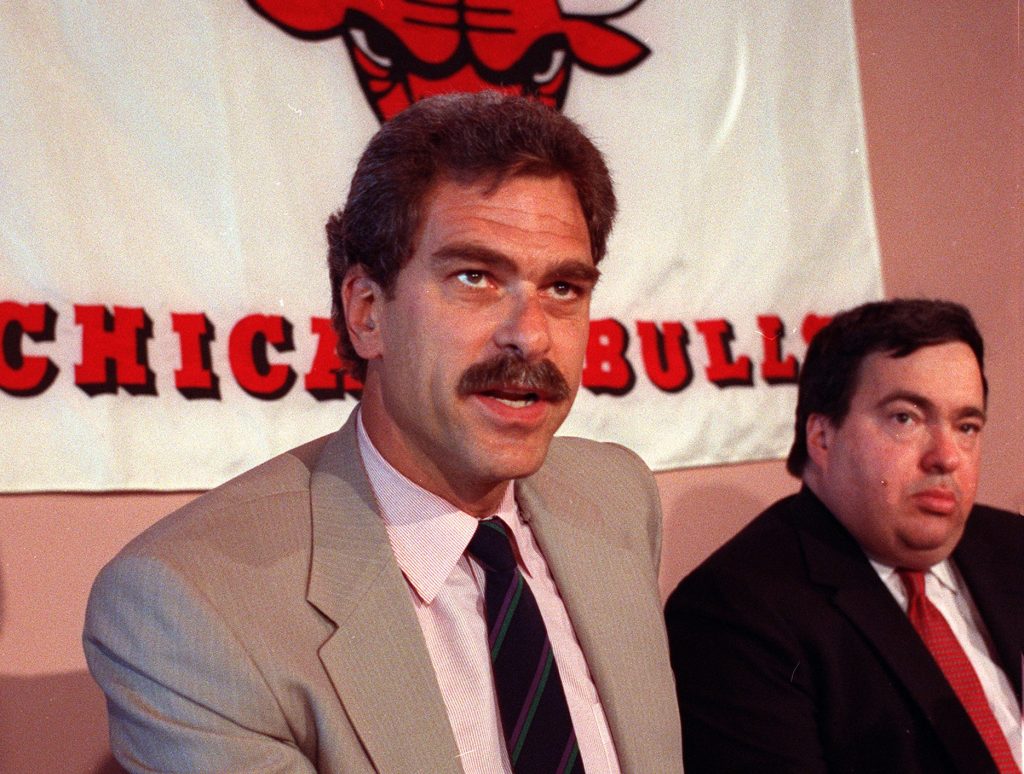Here’s a look back at what happened in the Chicago area on July 10, according to the Tribune’s archives.
Is an important event missing from this date? Email us.
Weather records (from the National Weather Service, Chicago)
- High temperature: 102 degrees (1936)
- Low temperature: 50 degrees (1997)
- Precipitation: 1.89 inches (1876)
- Snowfall: None
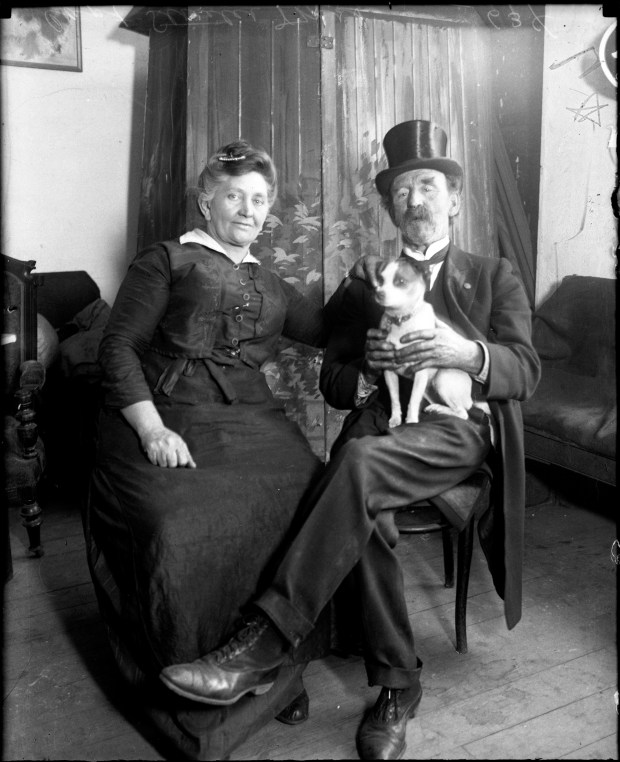 Captain George Wellington Streeter and Ma Streeter with their dog, Spot. In 1921, the Tribune wrote at the time of Streeter’s death, “The veteran mariner was photographed wearing the battered silk hat, which was part of his uniform in many battles for the possession of the ‘Deestrick of Lake Michigan,’ the rich lands east of Lake Shore Drive, where now many of Chicago’s wealthiest families live. The ‘Cap’n and his dog were almost inseparable.” (Chicago Tribune historical photo)
Captain George Wellington Streeter and Ma Streeter with their dog, Spot. In 1921, the Tribune wrote at the time of Streeter’s death, “The veteran mariner was photographed wearing the battered silk hat, which was part of his uniform in many battles for the possession of the ‘Deestrick of Lake Michigan,’ the rich lands east of Lake Shore Drive, where now many of Chicago’s wealthiest families live. The ‘Cap’n and his dog were almost inseparable.” (Chicago Tribune historical photo)
1886: Capt. George Wellington Streeter’s steamboat Reutan ran aground on a Near North Side sandbar now known as Streeterville.
From the 1880s until his death in 1921, Streeter asserted not just ownership but sovereignty over 186 acres of prime lakeshore, between the mouth of the Chicago River and Oak Street.
An 8-foot bronze statue of Streeter — wearing a top hat and holding pup Spot — stands at the northwest corner of McClurg Court and Grand Avenue.
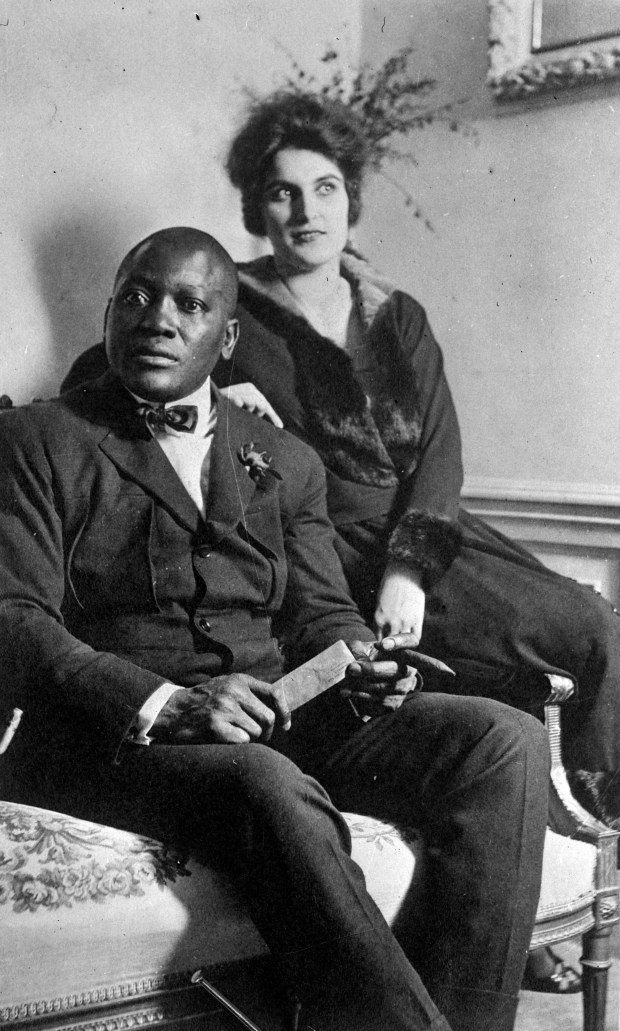 Boxing legend Jack Johnson and his wife, Lucille, in an undated photo. (Chicago Tribune historical photo)
Boxing legend Jack Johnson and his wife, Lucille, in an undated photo. (Chicago Tribune historical photo)
1912: Black heavyweight champion Jack Johnson opened Cafe de Champion, 41 W. 31st St. in Bronzeville. But only three months after it opened to fanfare, his wife, Etta, died by suicide in the couple’s apartment above the venue while revelers partied below. The shooting made the front page of the Tribune the next day.
In 1913, an all-white jury in Chicago convicted Johnson of traveling with his white girlfriend, Lucille Cameron, in violation of the Mann Act, which made it illegal to transport women across state lines for “immoral” purposes.
The case would later be held up as a deplorable example of institutional racism in early 20th-century America. Johnson was sentenced to a year and a day in prison in June 1913, but fled to Canada with Cameron, whom he married while free on bond. He remained a fugitive for seven years, traveling from Europe to Mexico, where he fought bulls and ran a bar called the Main Event.
President Donald Trump granted a rare posthumous pardon to Johnson on May 24, 2018.
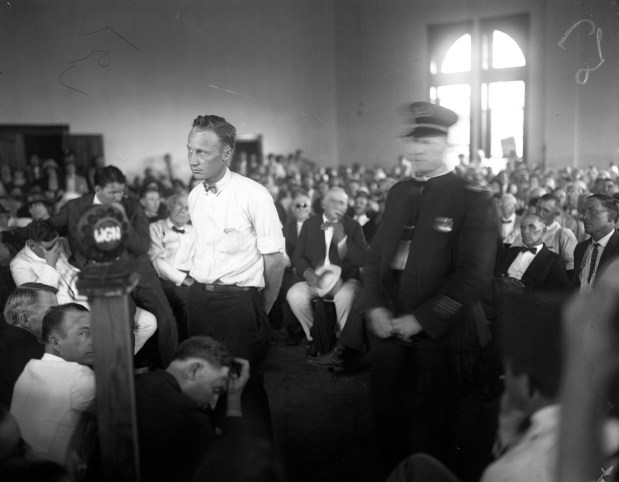 School teacher John Scopes of Dayton, Tennessee, stands before Judge Raulston while on trial in July 1925 for teaching human evolution in school, in violation of Tennessee’s Butler Act. (Chicago Herald and Examiner)
School teacher John Scopes of Dayton, Tennessee, stands before Judge Raulston while on trial in July 1925 for teaching human evolution in school, in violation of Tennessee’s Butler Act. (Chicago Herald and Examiner)
1925: John Thomas Scopes, charged with teaching evolution in Tennessee, went to court in the celebrated “Monkey Trial.” WGN Radio broadcasted the proceedings live — including Clarence Darrow’s defense of Scopes — a milestone for the new medium of radio, and a flesh-and-blood Chicago institution.
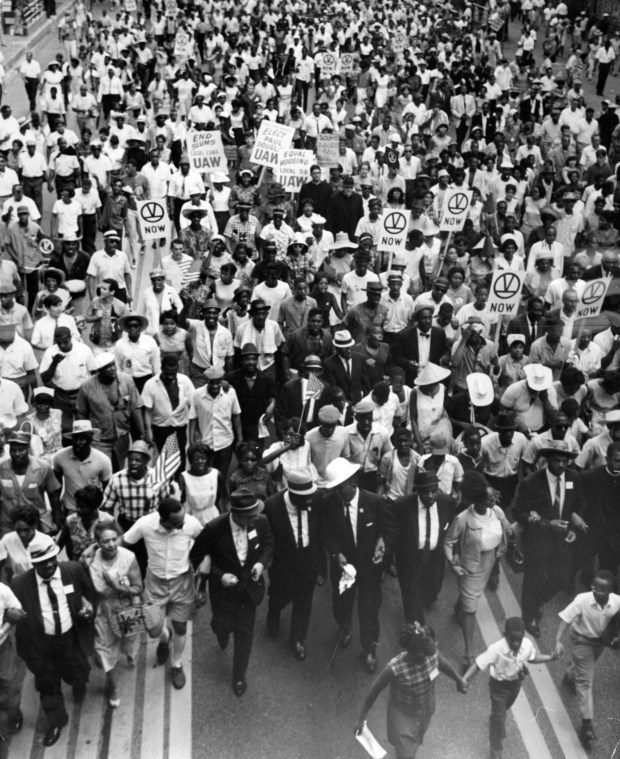 A crowd of 5,000 civil rights marchers swarmed down State Street on July 10, 1966, after a rally at Soldier Field where the Rev. Martin Luther King spoke. King led the march and tacked a list of demands on the door of City Hall. (Chicago Tribune historical photo)
A crowd of 5,000 civil rights marchers swarmed down State Street on July 10, 1966, after a rally at Soldier Field where the Rev. Martin Luther King spoke. King led the march and tacked a list of demands on the door of City Hall. (Chicago Tribune historical photo)
1966: Two years after the Rev. Martin Luther King Jr. was the keynote speaker at the Illinois Rally for Civil Rights at Soldier Field, he returned to the venue to deliver another speech on a sweltering day.
King told the 30,000 attendees, “This day we must decide to fill up the jails of Chicago, if necessary, in order to end slums.” He outlined 14 basic goals of the Chicago Freedom Movement and later posted them to the LaSalle Street entrance of City Hall.
 Tribune reporter Sam Smith called new Chicago Bulls head coach Phil Jackson “a low-key scholarly sort,” when the then-43-year-old was introduced by the team on July 10, 1989. (Chicago Tribune)
Tribune reporter Sam Smith called new Chicago Bulls head coach Phil Jackson “a low-key scholarly sort,” when the then-43-year-old was introduced by the team on July 10, 1989. (Chicago Tribune)
1989: Phil Jackson was hired as head coach of the Chicago Bulls, replacing Doug Collins.
‘Holy (expletive)! That’s Michael Jordan.’ A behind-the-scenes look at ‘The Last Dance’
After the Bulls won their sixth championship trophy, Jackson departed — and so did Michael Jordan and Scottie Pippen. No coach ever enjoyed as much championship success in Chicago.
“This was our last dance and it was a wonderful waltz,” he said at the team’s championship rally in Grant Park.
Want more vintage Chicago?
Subscribe to the free Vintage Chicago Tribune newsletter, join our Chicagoland history Facebook group, stay current with Today in Chicago History and follow us on Instagram for more from Chicago’s past.
Have an idea for Vintage Chicago Tribune? Share it with Kori Rumore and Marianne Mather at krumore@chicagotribune.com and mmather@chicagotribune.com
